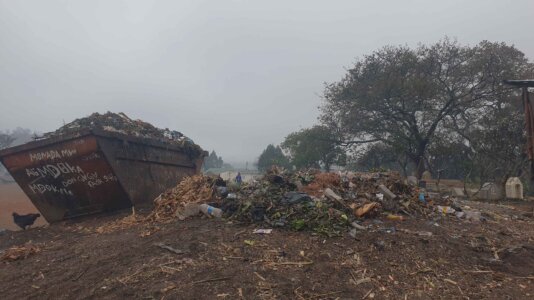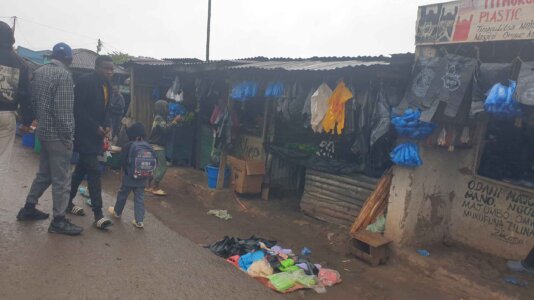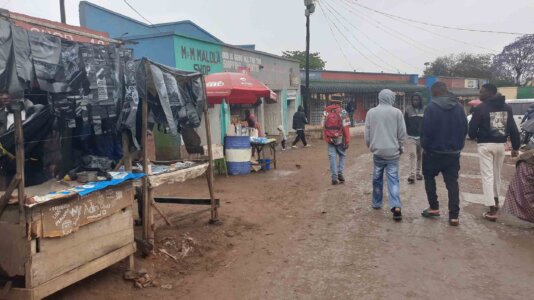- About
- Topics
- Story
- In-Depth
- Picks
- Opinion
- News
- Donate
- Signup for our newsletterOur Editors' Best Picks.Send
Read, Debate: Engage.
| September 30, 2024 | |
|---|---|
| topic: | Pollution |
| tags: | #Malawi, #plastic pollution, #single use plastic |
| located: | Malawi |
| by: | Charles Mpaka |
Thin plastics have become a widespread commodity in both rural and urban markets across Malawi, thriving among formal and informal traders alike. They are frequently discarded in household rubbish pits and dumped in landfills, clogging gutters on roadsides and cluttering rivers in urban centres.
Environmental activists argue that if the law regulating their production and use had been enforced, plastic pollution would likely have started declining as early as 2015.
Court documents reviewed by FairPlanet reveal that Malawi's campaign against thin plastics began 11 years earlier, in 2004, when the Department of Environmental Affairs initiated efforts to ban their production and use as part of a broader strategy to combat pollution.
But despite the Environmental Management Act of 1996 containing significant provisions against pollution, it lacked specific regulations on thin plastics, limiting the government's ability to enforce measures effectively.
Action against thin plastics gained momentum in 2015, when the government introduced the Environmental Management (Plastics) Regulations, recognising the shortcomings of the 1996 law.
Malawi is grappling with a plastics pollution crisis. A 2019 policy brief by the United Nations Development Programme (UNDP) and two local organisations estimates that the country produces at least 75,000 tonnes of plastic annually, with 80 per cent of it being single-use and non-recyclable.
It further states Malawians are producing "more waste per capita than their sub-Saharan counterparts, creating a demand which far outstrips the capacity of current waste management systems."
"Rapid urbanisation, coupled with changing consumer demands, is driving further escalation in plastic production in Malawi," the document reads.
In response to the growing challenge and in line with its commitment to international treaties on plastics and climate change, Malawi became one of the first African countrie to enforce a ban on thin plastics in 2015 through newly implemented regulations.
Section 3 of the Environmental Management (Plastics) Regulations prohibits the "importation, manufacture, trade and commercial distribution of plastic bags and plastic sheets made of plastic film with a wall thickness of 60 micrometres for use within Malawi."
According to the regulations, anyone found in violation of this law faces up to three months imprisonment, and the government is authorised to confiscate any equipment or property associated with the offence.
The government officially gazetted the regulations on 20 March, 2015, and issued a notice stating that the ban would take effect on 30 June of that year.
To date, the government has yet to fully implement the regulations, facing multiple obstacles, including a series of four court orders secured by plastics manufacturers and delays in the court system, partly attributed to the unavailability of judges and missing case files.
The plastics manufacturing industry in Malawi is largely dominated by business people of Indian origin, with some involvement from Chinese business owners. Notably, two companies that were prominent in securing earlier injunctions - Aero Plastics Industries Limited and Golden Plastics Limited - are owned by individuals of Indian descent, often referred to locally as Malawians of Indian origin.
In the latest case, where 11 companies have sought another court order, the firms include City Plastics Industry, Flexo Pack Ltd, G. Plastics Wholesale and Retail, G.S Plastic Industry, Jagot Plastics Ltd, O.G Plastics Industries (2008) Ltd, Plastimax Ltd, Polypack Ltd, Qingdao Recycling Ltd, Sharma Industries and Shore Rubber (Lilongwe) Ltd.
But resistance to the ban began even before the regulations took effect.
In a protest letter dated March 2014, plastic manufacturers opposed the government’s ban, arguing that it would negatively impact local communities, the industry and the economy.
"Most of us have designed this industry based on the need and affordability of the local people. Most of the people cannot afford to spend more money on packaging," reads the letter, which was addressed to the Minister of Natural Resources and Climate Change. "Increasing the micron, as per your request, will increase the price of the products which will result in less sales and less revenue to the government."
The producers argued that rather than imposing a ban, the government should have collaborated with the Plastics Manufacturers Association to address plastic waste management and removal from the environment.
"Some companies have already initiated to set up a plastic recycling plant and informed the government about that project. By the implementation of this project, the Malawi environment will be free from plastics," they said.
They further claimed to be developing new technology aimed at improving the biodegradability of their plastic products. Details regarding this technology were not made public.
Currently, Malawi lacks the capacity to recycle the vast quantities of plastics it produces, as the country still does not have a recycling plant equipped to handle the volume of plastic waste generated.
Blantyre, Malawi-based environmental activist Charles Mkoka, Executive Director of the local NGO Coordination Union for the Rehabilitation of the Environment (CURE), highlighted modest efforts by some groups that are repurposing plastics into products like eco-friendly bricks.
"[But] these are not investments of plastics manufacturers," he told FairPlanet. "They are efforts towards waste management and recycling in general."
In April this year, Malawi’s Chief Justice, Rezine Mzikamanda, requested the parties involved in the injunction case against the thin plastics ban to resubmit their documents after the case file went missing in the court system. He expressed his intent to resolve the matter swiftly.
In June 2024, the ban was given a new lease on life when nine judges of the Supreme Court of Appeal, including the Chief Justice, dismissed an appeal challenging an earlier court order that upheld the ban.
The government set dates for the ban to take effect, but just before its implementation, on 9 July, a new injunction emerged. Eleven plastics companies, none of which had previously contested the matter, successfully halted the Ministry of Natural Resources and Climate Change from proceeding with the ban.
Their lawyer, Wapona Kita, told local media that the ministry flouted procedures when coming up with the regulations in 2015.
"The minister made the regulation without recommendations from the Environmental Management Council. That means the regulations are invalid and unconstitutional," he said.
"Secondly, laws are made in Parliament. We understand that Parliament has powers to delegate its powers but in this case, the delegated powers to the minister are very restrictive and they are only to deal with management of pollution.
Kita concluded that Parliament directed the ministry to manage pollution - not to impose a plastics ban, an authority the minister lacks in his view. He added that they are now escalating the matter to the Constitutional Court.
In a joint statement on 16 July 2025, 30 civil society organizations (CSOs) condemned the new injunction, accusing the companies of hindering every Malawian’s right to a clean and healthy environment.
"The manner in which the ban on thin plastics has been relentlessly blocked by repetitive injunctions has convinced us that the goal of these plastic companies and the entire plastic industry is to use the courts as a shield for continued pollution of the environment," they said.
They vowed to fight the new order.
"While we respect the rule of law and welcome investors in Malawi, our country has no room for those who prioritise obscene profits over environmental stewardship. We will not tolerate irresponsible investments that harm our environment. Under our watch, we will fiercely defend our nation and our children’s future," they said.
Attorney General Thabo Chakaka Nyirenda, who is representing government agencies in the case, described the latest injunction as a ploy by plastic producers to frustrate the ban.
"We are challenging it," said Nyirenda, who has since been joined on the case by two former Attorney Generals.
Mkoka, whose organisation was among the signatories of the CSO statement, told FairPlanet in an interview that the prolonged delay in enforcing the ban is exacerbating the environmental damage caused by plastics in Malawi.
"It also sets a negative precedent regionally and worldwide," he added. "If a country like Malawi struggles to enforce a ban on thin plastics, it may signal to other nations that such bans are challenging to implement, leading to further delays or resistance."
Mkoka further noted that as Southern African countries strive to harmonise their policies for economic and environmental cooperation, delays in implementing plastic bans risk hindering efforts to achieve regional policy alignment.
"This makes it harder to develop unified regional strategies for environmental sustainability," he concluded.
In their response to the latest injunction, the CSOs demanded prompt action from the government, urged plastic producers to cease exploiting the judiciary with repeated injunctions and called on the judiciary to uphold the rights of Malawians.
The CSOs also encouraged citizens to actively reject any thin plastics available on the market.
"Do not buy or take any thin plastic packaging material if you cannot re-use it. Please use alternative carrier bags," they said.
It appears, however, that this message has yet to resonate with many Malawians, as thin plastics continue to be widely purchased and used.
Image by Charles Mpaka.
By copying the embed code below, you agree to adhere to our republishing guidelines.


